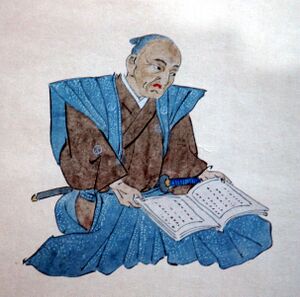Difference between revisions of "Kumazawa Banzan"
Msr.iaidoka (talk | contribs) (Re-edited and added a picture. Un-draftinated) |
m |
||
| Line 14: | Line 14: | ||
[[Category:Samurai]][[Category:Edo Period]] | [[Category:Samurai]][[Category:Edo Period]] | ||
| + | {{sources}} | ||
Revision as of 15:00, 22 October 2006
The storied warrior-philosopher of the Edo Period. He began his “formal” career as a ronin at fifteen years of age. He is best known as an adherent to the "the school of the mind" that applied the introspectiveness of the school of mind to political theory in Japan following the Edo Period. This school is seen as which the human mind is an embodying the principle of the universe, rather than the "school of principle".
He drilled dilligently in the martial arts with special zeal, becomming quite a worthy samurai. He gave up consuming to rice so as not to take on weight, and refrained from contact with women for ten years.
When he was stationed as a guard in Edo castle he would practice in swordsmanship at night with a wooden sword (bokken). In order to maintain good physical condition he would run on rooftop of the castle, surprising his colleagues and making them think he was possessed.
Kumazawa Banzan served in a high administrative post and was assigned to study philosophical and economic problems in regards to samurai life. He condemned meaningless waste of rice and talent along with idleness among the samurai class. Banzan's goal was to reform the Japanese government by advocating the adoption of a political system based on merit rather than heredity and the employment of political principles to fit the situation. The Tokugawa regime in the end responded quite poorly to this idea, due to the fact that the shogunate runs through the hereditary ways.
You can help SamuraiWiki by editing it to include sources. Click here for a list of articles that need citations.
